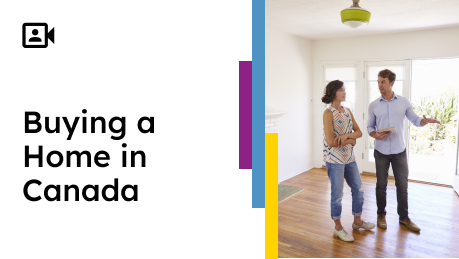For many newcomers buying a home in Canada is a cherished dream. Depending on the customs and traditions in the country you grew up in, home ownership could mean different things to you: for some it may weigh heavy on culture and family while for others, it may skew towards investment, finances, and putting down some equity.
86 per cent of newcomers in Canada viewed real estate as a good investment. Newcomers represented one in every five home buyers (21 per cent). 75 per cent arrived with savings to purchase a property. The average duration of time before newcomers purchase a home is three years after arriving in Canada.
– 2019 report published by Royal LePage
Whether you’re looking to buy a home within the first few months of moving to Canada or within the next couple of years, as someone who’s new to the country, stress and anxiety can easily take over your life while purchasing property. In this article, we will walk you through some common challenges newcomers face so you can learn from them and be better prepared financially, emotionally and mentally to successfully buy a home in Canada.
Common house hunting challenges
1. Affordability: Finding a home within your budget and balancing needs vs. wants
In recent times, soaring real estate prices, especially in major Canadian cities, has made home ownership challenging for average middle class individuals. From the type of home (detached, semi-detached, condo, townhouse, etc.) and location to size, and everything in between, there are a variety of variables that influence the price of a property. You can buy a home in pre-construction, one that’s brand new and ready-to-move-in, or one that’s being resold. Pre-construction homes are typically cheaper than their resale or ready-to-move-in counterparts but do have their advantages and disadvantages. Working with a realtor and a lawyer will help you get a more realistic sense of some of the additional costs incurred.
|
From a finance (or down payment) perspective, the government of Canada offers the First-Time Home Buyer Incentive to help people across Canada purchase their first home. This program provides buyers with five (or 10 per cent, if it’s a new home) of the home’s purchase price, in the form of a no-interest loan, to put toward a down payment. This addition helps lower your mortgage carrying costs, making home ownership more affordable. You pay back the same percentage of the value of your home when you sell it or within a 25-year window.
The First-Time Home Buyer Incentive is like a second mortgage on your home and has some eligibility criteria and fees attached to it. Consult with a mortgage specialist to know if the Incentive would be beneficial to your unique situation. |
Another way to fund your down payment is withdrawing from the Registered Retirement Savings Plan (RRSP). An RRSP is a popular investment product where investment earnings are tax-deferred until your retirement and contributions are tax-deductible, so they reduce your taxable income. When you decide to withdraw the money, withdrawals are added to taxable income the year the money is withdrawn. However, first-time homebuyers are allowed to withdraw money from their RRSP for a down payment without paying tax.
Can you buy a home within the first few months of moving to Canada?
You may qualify for a mortgage to buy a house or property within the first few months of moving to Canada, if you’re able to meet the basic criteria of down payment, credit history and/or assets, and are able to show a steady income. Note that if you opt for a down payment of less than 20 per cent of the purchase cost, you need to show at least three months of full-time employment in Canada.
Can you buy a home in Canada as a non-resident?
Starting January 1, 2023, Canada is banned foreign residents from purchasing residential property in Canada for a period of two years.
Prior to the ban, non-residents intending to purchase property in Canada were subject to an extra tax in certain provinces. Banks could ask for a higher down payment and there may be additional regulations to follow, depending on the province.
| Download Arrive’s Housing Guide to understand the basics of home financing, find out more about hidden costs, and learn a few budgeting tips and advice for buying a home. |
2. Bidding wars
While purchasing real estate (or even renting) in major cities, bidding wars are growing increasingly common. Sellers often list their home at a lower cost than what it’s worth (list price) in the hopes of capturing buyer interest, which then leads to a bidding war. From the buyer’s perspective, however, it can be a frustrating and emotional experience.
For example, you may find a home listed for $499,000 CAD but the seller might believe they could get around $600,000 CAD. This list price will attract buyers with a budget of $500,000 CAD to approximately $600,000 CAD. Once the bidding is complete, the seller may very well get over the $600,000 CAD they were hoping for, leaving buyers with budgets closer to the listing price disappointed.
|
There’s no proven way to avoid a bidding war but doing some research can help you anticipate the approximate selling price and accordingly place a reasonable offer on the listing.
3. Lack of sufficient credit history while getting a mortgage
When buying a home, there are three main requirements to be fulfilled as part of a mortgage application:
- A down payment: This is the cash that you would pay for the purchase of your house or property. For a purchase of up to $500,000 CAD, the minimum down payment required is generally five per cent of the total cost, but it can also vary based on other factors such as your status in Canada (permanent resident, temporary foreign worker, student, etc.), assets owned, and your income. For purchases worth $500,000 to $999,000 CAD, you would need 10 per cent, and for homes that cost over a million dollars, you have to pay a minimum of 20 per cent as a down payment.
- Credit history: Borrowers are usually expected to provide a year-long credit history either from Canada or your home country. The requirement for a credit history may be excluded if a large down payment is made. In this scenario, your other personal assets in Canada may be considered. Building good credit history takes time; therefore, get started as soon as you move to Canada.
- Assurance of mortgage repayment: The financial institution or lender will typically assess the means through which you would be able to repay the loan. Existing sources of income (with a 90-day history) and your potential to earn an income in Canada are taken into consideration while approving a mortgage application.
One of the ways to circumvent this challenge is to get pre-approved for your mortgage. Having pre-approval indicates that you’ve met the basic eligibility criteria (down payment, credit history, and income) for getting a mortgage. As part of the pre-approval process, the bank will let you know the maximum purchase price of your home and outline the down payment required. This will ensure stress-free shopping for your new home! |
4. Language barriers
For many newcomers to Canada, English is not their first language. Language barriers coupled with little knowledge of the housing market can make finding the right home very challenging. Throw in conversations and documentation with realtors, lawyers and home sellers and it can soon become an overwhelming process.
If you have trouble communicating in English or if you’re moving to a French neighbourhood and have trouble understanding French, try to find a realtor who is fluent in English/French and also speaks your language, listens to your needs, and can patiently explain the process to you in layman’s terms. |
| See English as a second language: ESL resources in Canada and How to improve your English and adapt to Canadian culture for tips, advice and resources on improving your language skills. |
5. Figuring out which interest rate (fixed or variable) you should opt for
In Canada, mortgages have two types of interest rates. Borrowers can choose between –
- A fixed interest rate: Does not fluctuate and is applicable for a pre-defined time period (called a “term”). Generally, the term most people opt for is five years.
- A variable interest rate: Fluctuates based on the prime lending rate – which is primarily influenced by the policy interest rate set by the Bank of Canada (BoC) and is typically revised eight times a year. The prime lending rate is the annual interest rate that Canada’s major banks and financial institutions use to set interest rates for variable loans and lines of credit, including variable-rate mortgages. Depending on your financial institution or the lender, you may be able to switch from a variable interest rate to a fixed-rate at no additional cost. Be sure to check with your lender of any payment changes based on the prime rate and review all potential risks.
Depending on your personal financial situation and the economic conditions, in some cases a fixed interest rate might be beneficial for you while others may find a variable interest rate to be favourable. A mortgage specialist can help you decide which option would work well for your unique situation. |
Finding a home in Canada as a newcomer can be a tedious and overwhelming process, especially with various financial constraints. Speak with an RBC Advisor to stay on top of your finances and be prepared to purchase your first home.






